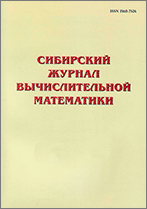|
|
Sibirskii Zhurnal Vychislitel'noi Matematiki, 2010, Volume 13, Number 3, Pages 323–341
(Mi sjvm285)
|
 |
|
 |
The inverse problem for acoustics equations. The multi-level adaptive algorithm
A. F. Mastryukov
Institute of Computational Mathematics and Mathematical Geophysics (Computing Center), Siberian Branch of the Russian Academy of Sciences, Novosibirsk
Abstract:
This paper presents a numerical solution to the inverse problem for the acoustic equations using an optimization method for a stratified medium. Based on the allocation of the acoustic wave field on the medium surface, the 1D allocations of a medium density as well as velocity and absorption coefficient of the acoustic wave are determined.
The absorption is considered in a sample piece of the Foigt skew field. The conjugate gradients and the Newton methods are used for minimization.
To increase the efficiency of the numerical algorithm, we propose a multi-level adaptable algorithm. This algorithm is based on the partitioning the whole algorithm of the solution to the inverse problem into a series of consecutive levels. Each of such levels is characterized by the number of parameters, defined at it. While passing from one level on another level, the number of parameters adaptively changes in terms of the value of a functional and convergence rate.
Selection of minimization parameters is illustrated on the results of the inverse problem solution in a spectral domain, when the desired values are presented as a Tchebychev polynomial series, and minimization is carried out according to the value of this quantity at a point.
The efficiency of the method proposed is compared to the non-adaptive method of solution. The selection of the most optimal parameters of the multi-level method is presented.
It is shown that the multi-level algorithm possesses certain advantages as compared to the one without partitioning into levels. The algorithm proposed first of all allows obtaining a more exact solution to the inverse problem.
Key words:
inversion, inverse problem, acoustic, velocity, attenuation, density, adaptive, multi-level, optimization method, efficiency, precision.
Received: 31.03.2009
Revised: 24.06.2009
Citation:
A. F. Mastryukov, “The inverse problem for acoustics equations. The multi-level adaptive algorithm”, Sib. Zh. Vychisl. Mat., 13:3 (2010), 323–341; Num. Anal. Appl., 3:3 (2010), 263–278
Linking options:
https://www.mathnet.ru/eng/sjvm285 https://www.mathnet.ru/eng/sjvm/v13/i3/p323
|

| Statistics & downloads: |
| Abstract page: | 375 | | Full-text PDF : | 156 | | References: | 52 | | First page: | 7 |
|




 Contact us:
Contact us: Terms of Use
Terms of Use
 Registration to the website
Registration to the website Logotypes
Logotypes









 Citation in format
Citation in format 